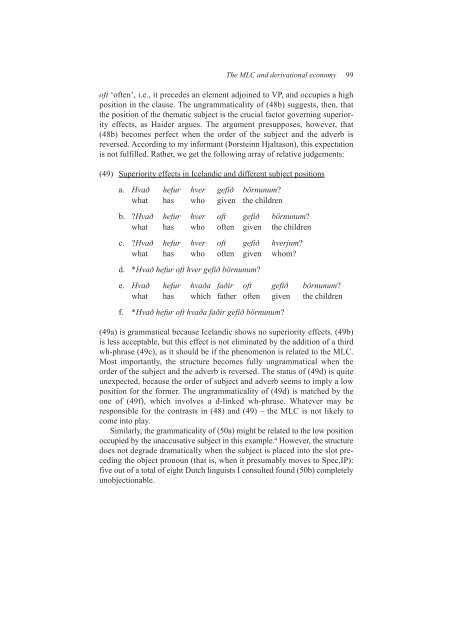Minimality Effects in Syntax · The MLC and Derivational Economy ...
Minimality Effects in Syntax · The MLC and Derivational Economy ...
Minimality Effects in Syntax · The MLC and Derivational Economy ...
You also want an ePaper? Increase the reach of your titles
YUMPU automatically turns print PDFs into web optimized ePapers that Google loves.
oft ‘often’, i.e., it precedes an element adjo<strong>in</strong>ed to VP, <strong>and</strong> occupies a high<br />
position <strong>in</strong> the clause. <strong>The</strong> ungrammaticality of (48b) suggests, then, that<br />
the position of the thematic subject is the crucial factor govern<strong>in</strong>g superiority<br />
effects, as Haider argues. <strong>The</strong> argument presupposes, however, that<br />
(48b) becomes perfect when the order of the subject <strong>and</strong> the adverb is<br />
reversed. Accord<strong>in</strong>g to my <strong>in</strong>formant (-orste<strong>in</strong>n Hjaltason), this expectation<br />
is not fulfilled. Rather, we get the follow<strong>in</strong>g array of relative judgements:<br />
(49) Superiority effects <strong>in</strong> Icel<strong>and</strong>ic <strong>and</strong> different subject positions<br />
a. Hva# hefur hver gefi# börnunum?<br />
what has who given the children<br />
b.?Hva# hefur hver oft gefi# börnunum?<br />
what has who often given the children<br />
c.?Hva# hefur hver oft gefi# hverjum?<br />
what has who often given whom?<br />
d.*Hva# hefur oft hver gefi# börnunum?<br />
e. Hva# hefur hva#a fa#ir oft gefi# börnunum?<br />
what has which father often given the children<br />
f.*Hva# hefur oft hva#a fa#ir gefi# börnunum?<br />
<strong>The</strong> <strong>MLC</strong> <strong>and</strong> derivational economy 99<br />
(49a) is grammatical because Icel<strong>and</strong>ic shows no superiority effects. (49b)<br />
is less acceptable, but this effect is not elim<strong>in</strong>ated by the addition of a third<br />
wh-phrase (49c), as it should be if the phenomenon is related to the <strong>MLC</strong>.<br />
Most importantly, the structure becomes fully ungrammatical when the<br />
order of the subject <strong>and</strong> the adverb is reversed. <strong>The</strong> status of (49d) is quite<br />
unexpected, because the order of subject <strong>and</strong> adverb seems to imply a low<br />
position for the former. <strong>The</strong> ungrammaticality of (49d) is matched by the<br />
one of (49f), which <strong>in</strong>volves a d-l<strong>in</strong>ked wh-phrase. Whatever may be<br />
responsible for the contrasts <strong>in</strong> (48) <strong>and</strong> (49) – the <strong>MLC</strong> is not likely to<br />
come <strong>in</strong>to play.<br />
Similarly, the grammaticality of (50a) might be related to the low position<br />
occupied by the unaccusative subject <strong>in</strong> this example. 4 However, the structure<br />
does not degrade dramatically when the subject is placed <strong>in</strong>to the slot preced<strong>in</strong>g<br />
the object pronoun (that is, when it presumably moves to Spec,IP):<br />
five out of a total of eight Dutch l<strong>in</strong>guists I consulted found (50b) completely<br />
unobjectionable.
















